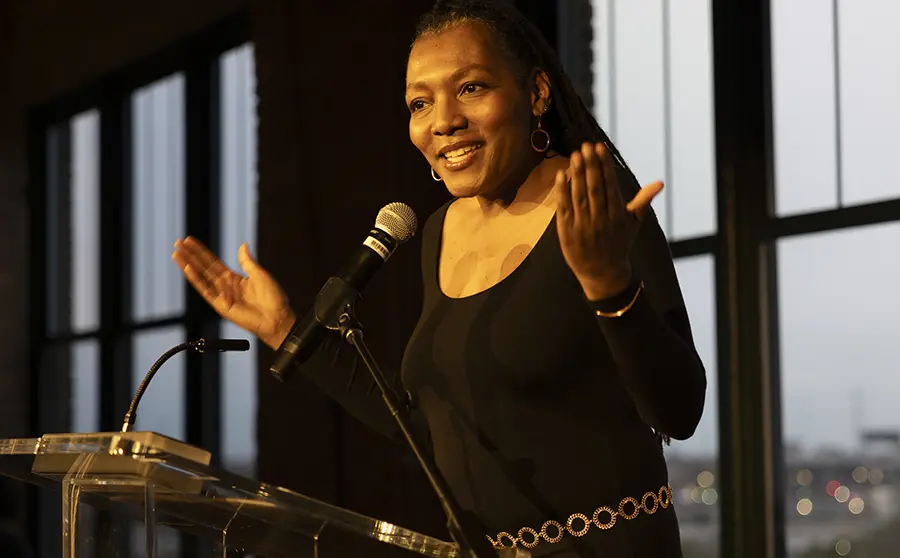
What "Changing Rules. Changing Lives." really looks like
April 25, 2024
As an organization born out of the War on Poverty, the Shriver Center on Poverty Law knows about the need to evolve. Nearly 60 years ago, we were founded as a national law firm for the poor. Today, we’re a national organization leading the fight for economic justice at the intersection of race and poverty.
The Shriver Center continues to shift and innovate to meet the urgent needs of the communities we serve. And although innovation has been key to our continued success, the core of our work remains constant: changing rules to change lives. That’s why we chose it as the theme of our 2024 Annual Gala.
This work is hard. And our victories are hard won. But change is possible — we create change every day with everyday warriors in this fight.
For example, in Illinois alone, the Shriver Center led efforts in 2005 to extend health coverage to every single child in the state. Before that win, roughly 250,000 kids were uninsured. Today, we continue to fight for safe, affordable homes for everyone; for income supports that lift working families out of poverty; and for preservation of the family unit whenever possible. And we continue to broaden our national network of advocates and advocacy organizations committed to the fight for racial and economic justice.
We must keep fighting because poverty remains an urgent crisis. In Chicago alone, more than 450,000 people live below the poverty line — that’s 1 in 7 of our neighbors, friends, and family members.
But here’s another hard truth. Systemic racism is persistent and destructive. It’s embedded into our societal structure, and it’s intended to disenfranchise and destabilize communities of color. Make no mistake: The fight for economic justice is very much a fight for racial justice.
Ultimately, racism comes as a cost to us all. Discriminatory policies have inflicted an astounding cost on the entire economy, reducing the collective wealth and income of all Americans. Here in the third largest city in the country, it’s estimated that metro Chicago’s gross domestic product would be 130 billion dollars higher if there were no racial gaps in income and employment.
This is why we do the work the way we do it. We fight for and alongside communities that are and have been excluded. We fight for children, youth, and families. We fight for those who have been told to sit down and be quiet. Nowadays, our unique approach of advocate, amplify, and activate is especially crucial.
The opposition is relentless. We’re up against highly coordinated attacks to roll back civil rights, roll out disinformation, and revise history. Overturning Roe v. Wade is not just a reproductive rights issue — it’s a broader health justice issue that affects people with low income, people of color, and immigrants the most. And reversing affirmative action threatens to limit students’ access to a quality education, which is the key to lifting people out of poverty for good.
We’re battling a lot of forces that are not just gaining traction in the court of law — they are dominating in the court of public opinion. There is a powerful and concerted effort underway to erase the history of economic oppression in the United States, particularly the history of people of color, all in their effort to reframe and control the narrative.
They’ve targeted diversity, equity, and inclusion initiatives. On social media, where fake news travels faster than the truth, conservatives now joke that DEI stands for “didn’t earn it.”
Let’s be honest: It can sometimes feel exhausting doing this work. The tweets and headlines both oversimplify and underestimate the extent of these issues. We’ve all scoffed at silly memes, but fake news has a real impact: It changes how people vote, what they support, and what they invest in. Our work to change policies and systems requires changing hearts and minds. That’s narrative change, in a nutshell.
At the Shriver Center, we know poverty is a policy choice — but we can make better choices when we have enough political will. During the pandemic, the American Rescue Plan Act expanded the federal child tax credit. And within six months, child poverty dropped by 36%. Because when we remove the highest barriers, we all benefit.
Currently, there’s a $78 billion bipartisan bill in Congress intended to preserve many of the child tax credit’s crucial protections. The Republican-led House overwhelmingly passed the bill, but right now it’s held up in the Senate, thanks to political maneuvering.
So instead of making smart, targeted investments that have been proven to work, we’re playing politics with children’s lives. That’s unacceptable. And that’s why we were down in Springfield earlier this month, working with coalition partners to pass an Illinois child tax credit. This would make Illinois the 15th state in the nation to have a statewide child tax credit.
Imagine a new reality, where everyone can provide for themselves and their families, where all people have access to quality medical care, where equal work earns equal pay, and where everyone has the power to determine their futures — regardless of race or where they come from.
Our new vision at the Shriver Center is a nation free from racism and poverty. With you in this fight, we’ll be able to achieve it. Together, we have the audacity to dream of an America that lives up to its highest ideals. We have the vision to invest in communities with the greatest need, whether urban, suburban, or rural. We have the hope that our children, grandchildren, and every generation beyond can thrive with dignity.
And together, we can support people and communities. We can get children and families the resources they need. We can build a better, brighter, more equitable nation for us all. That’s a future worth fighting for.